Organizational Behavior Report: Ryanair's Culture and Motivation
VerifiedAdded on 2023/01/09
|15
|4272
|95
Report
AI Summary
This report delves into the realm of organizational behavior, using Ryanair as a case study to illustrate key concepts. It begins by examining how organizational culture, politics, and power influence individual and team behavior and performance, drawing upon Charles Handy's cultural model and various types of power. The report then explores motivation theories, including content and process theories, with a focus on Maslow's hierarchy of needs and the expectancy theory. Furthermore, the report contrasts effective and ineffective teams, highlighting the attributes that contribute to each. Finally, it discusses organizational concepts in business situations, providing a comprehensive overview of organizational behavior principles and their practical applications within the context of Ryanair's operations.
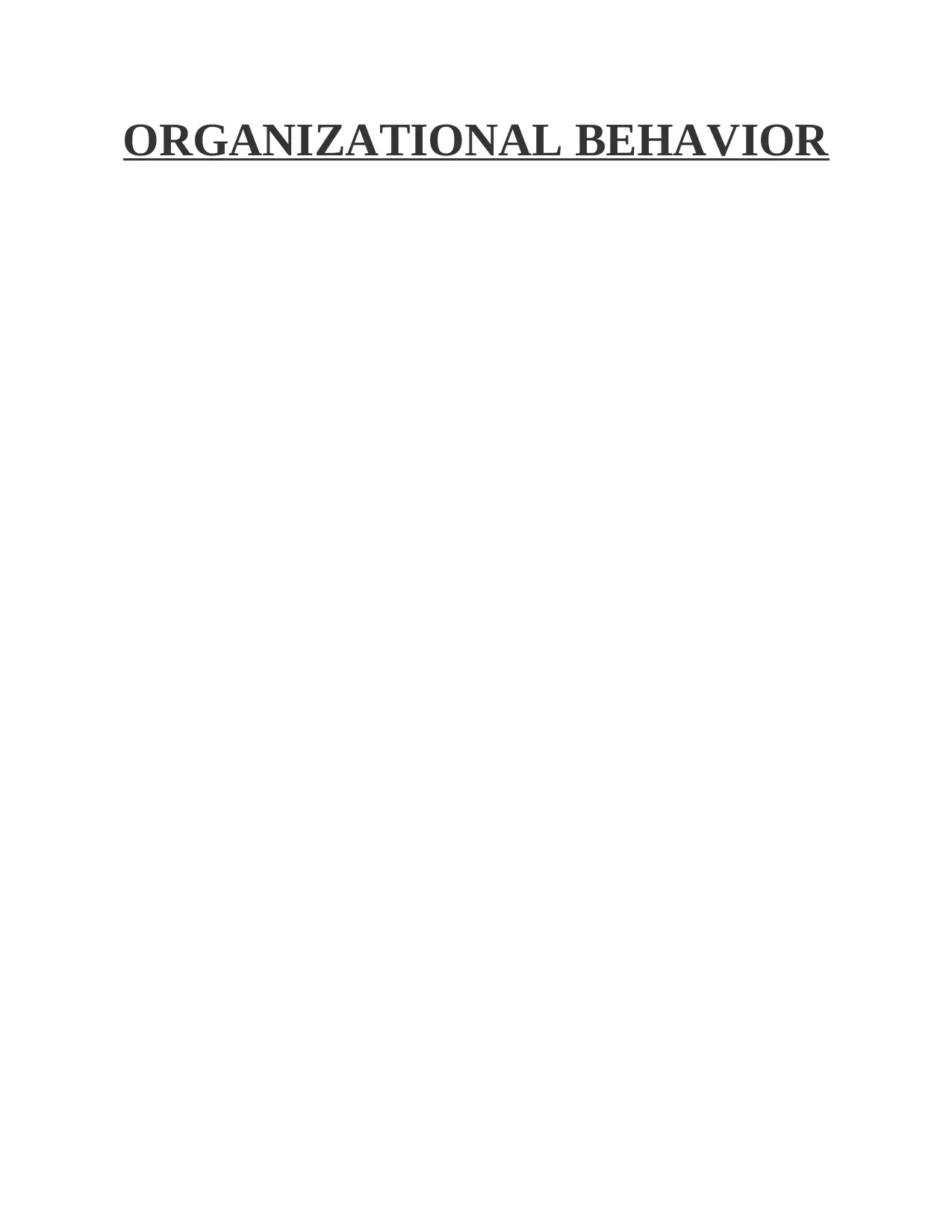
ORGANIZATIONAL BEHAVIOR
Paraphrase This Document
Need a fresh take? Get an instant paraphrase of this document with our AI Paraphraser
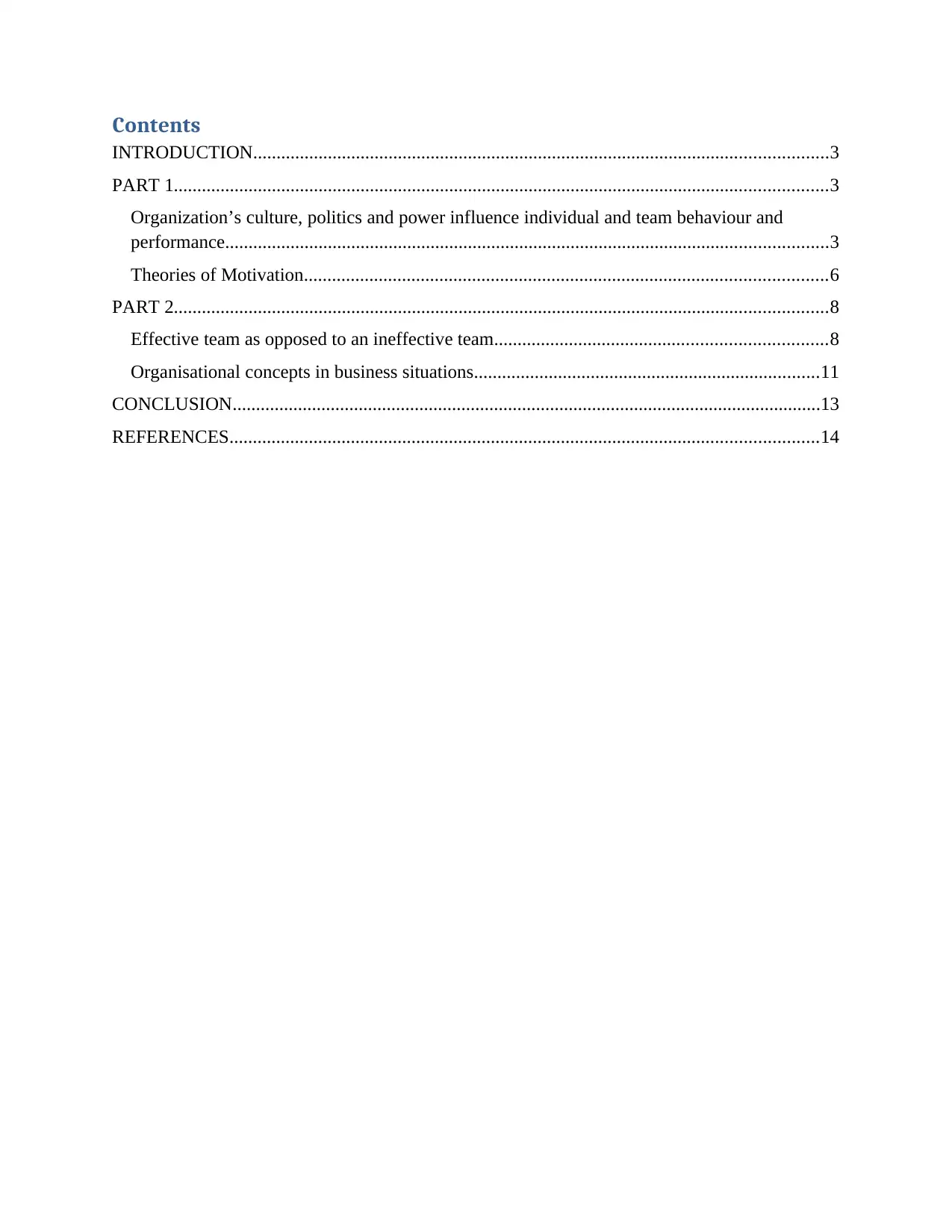
Contents
INTRODUCTION...........................................................................................................................3
PART 1............................................................................................................................................3
Organization’s culture, politics and power influence individual and team behaviour and
performance.................................................................................................................................3
Theories of Motivation................................................................................................................6
PART 2............................................................................................................................................8
Effective team as opposed to an ineffective team.......................................................................8
Organisational concepts in business situations..........................................................................11
CONCLUSION..............................................................................................................................13
REFERENCES..............................................................................................................................14
INTRODUCTION...........................................................................................................................3
PART 1............................................................................................................................................3
Organization’s culture, politics and power influence individual and team behaviour and
performance.................................................................................................................................3
Theories of Motivation................................................................................................................6
PART 2............................................................................................................................................8
Effective team as opposed to an ineffective team.......................................................................8
Organisational concepts in business situations..........................................................................11
CONCLUSION..............................................................................................................................13
REFERENCES..............................................................................................................................14
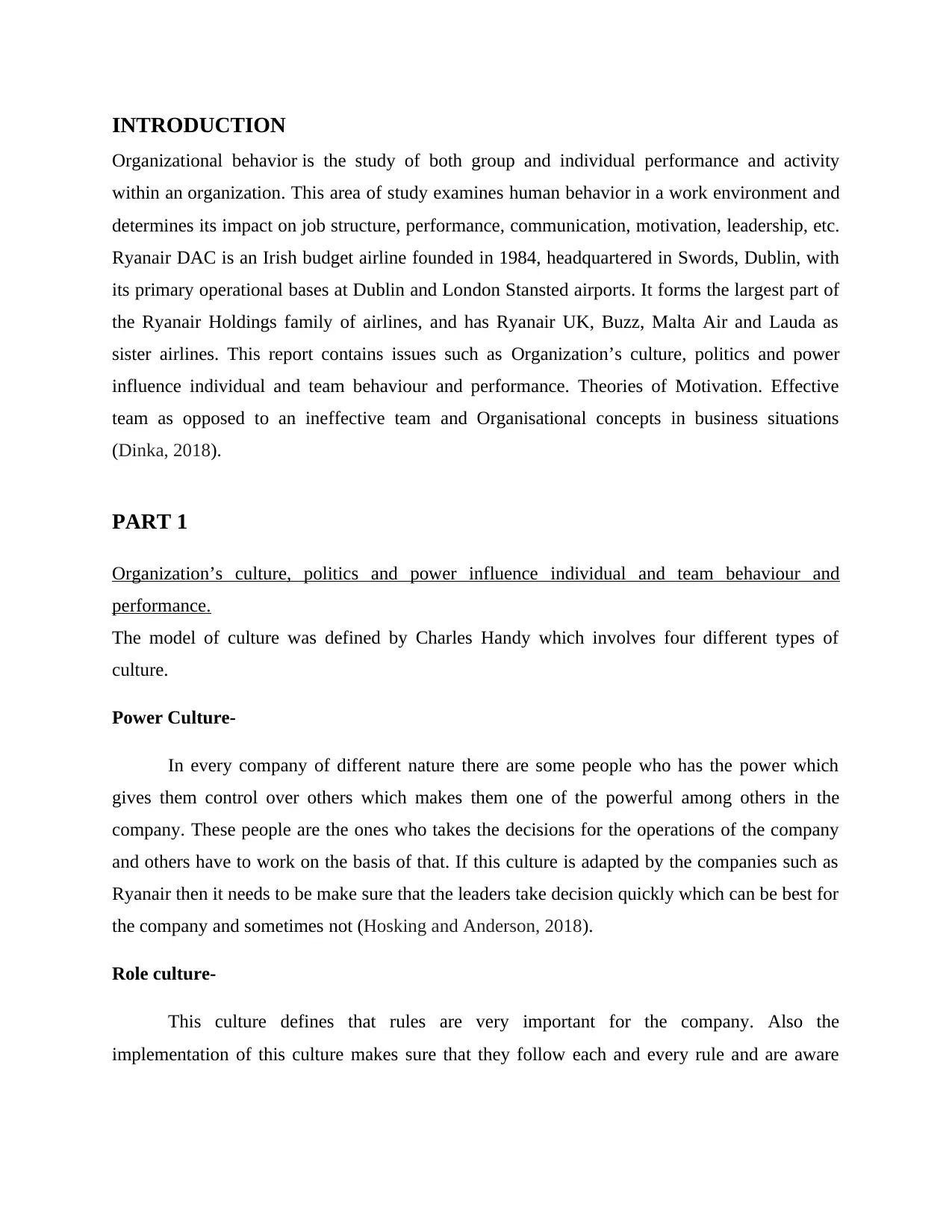
INTRODUCTION
Organizational behavior is the study of both group and individual performance and activity
within an organization. This area of study examines human behavior in a work environment and
determines its impact on job structure, performance, communication, motivation, leadership, etc.
Ryanair DAC is an Irish budget airline founded in 1984, headquartered in Swords, Dublin, with
its primary operational bases at Dublin and London Stansted airports. It forms the largest part of
the Ryanair Holdings family of airlines, and has Ryanair UK, Buzz, Malta Air and Lauda as
sister airlines. This report contains issues such as Organization’s culture, politics and power
influence individual and team behaviour and performance. Theories of Motivation. Effective
team as opposed to an ineffective team and Organisational concepts in business situations
(Dinka, 2018).
PART 1
Organization’s culture, politics and power influence individual and team behaviour and
performance.
The model of culture was defined by Charles Handy which involves four different types of
culture.
Power Culture-
In every company of different nature there are some people who has the power which
gives them control over others which makes them one of the powerful among others in the
company. These people are the ones who takes the decisions for the operations of the company
and others have to work on the basis of that. If this culture is adapted by the companies such as
Ryanair then it needs to be make sure that the leaders take decision quickly which can be best for
the company and sometimes not (Hosking and Anderson, 2018).
Role culture-
This culture defines that rules are very important for the company. Also the
implementation of this culture makes sure that they follow each and every rule and are aware
Organizational behavior is the study of both group and individual performance and activity
within an organization. This area of study examines human behavior in a work environment and
determines its impact on job structure, performance, communication, motivation, leadership, etc.
Ryanair DAC is an Irish budget airline founded in 1984, headquartered in Swords, Dublin, with
its primary operational bases at Dublin and London Stansted airports. It forms the largest part of
the Ryanair Holdings family of airlines, and has Ryanair UK, Buzz, Malta Air and Lauda as
sister airlines. This report contains issues such as Organization’s culture, politics and power
influence individual and team behaviour and performance. Theories of Motivation. Effective
team as opposed to an ineffective team and Organisational concepts in business situations
(Dinka, 2018).
PART 1
Organization’s culture, politics and power influence individual and team behaviour and
performance.
The model of culture was defined by Charles Handy which involves four different types of
culture.
Power Culture-
In every company of different nature there are some people who has the power which
gives them control over others which makes them one of the powerful among others in the
company. These people are the ones who takes the decisions for the operations of the company
and others have to work on the basis of that. If this culture is adapted by the companies such as
Ryanair then it needs to be make sure that the leaders take decision quickly which can be best for
the company and sometimes not (Hosking and Anderson, 2018).
Role culture-
This culture defines that rules are very important for the company. Also the
implementation of this culture makes sure that they follow each and every rule and are aware
⊘ This is a preview!⊘
Do you want full access?
Subscribe today to unlock all pages.

Trusted by 1+ million students worldwide
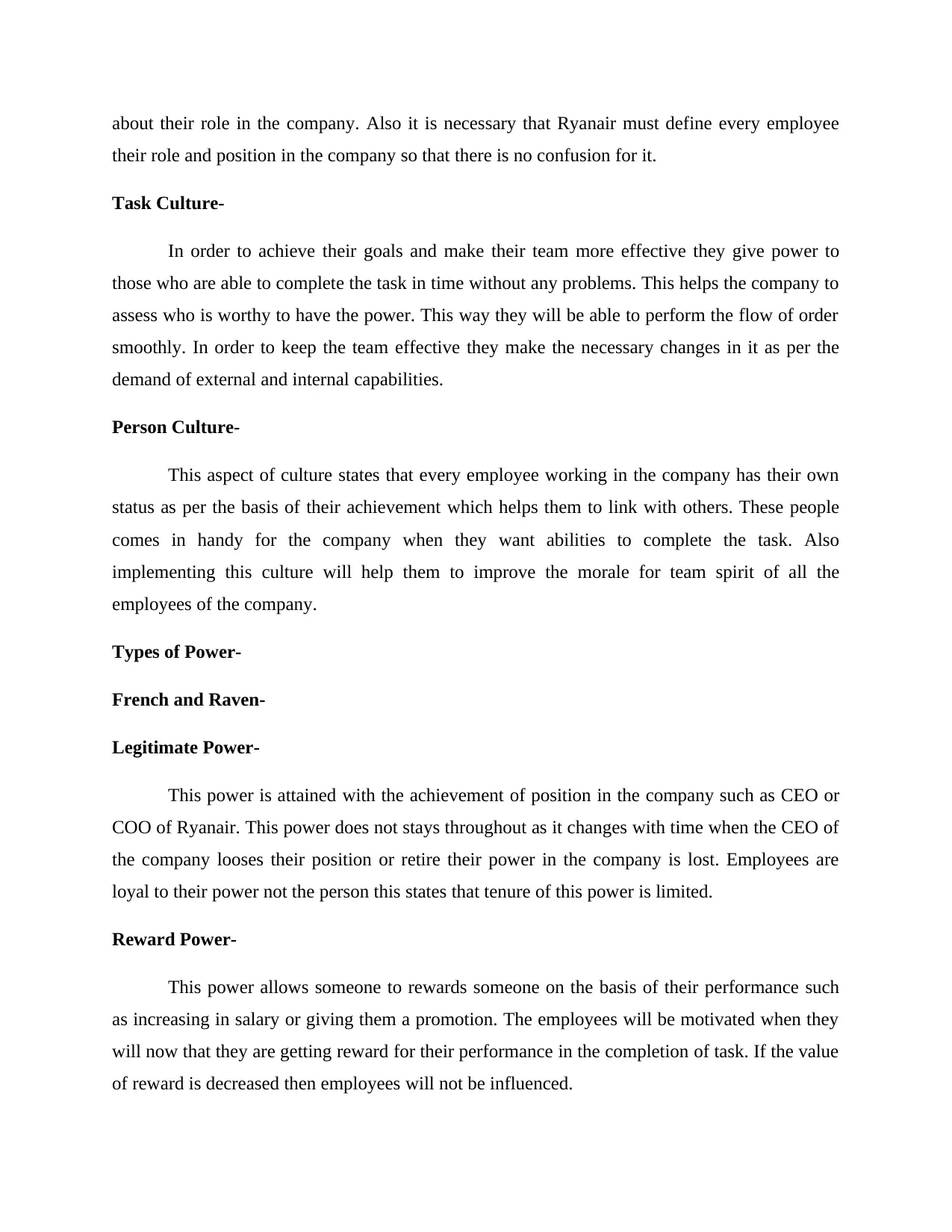
about their role in the company. Also it is necessary that Ryanair must define every employee
their role and position in the company so that there is no confusion for it.
Task Culture-
In order to achieve their goals and make their team more effective they give power to
those who are able to complete the task in time without any problems. This helps the company to
assess who is worthy to have the power. This way they will be able to perform the flow of order
smoothly. In order to keep the team effective they make the necessary changes in it as per the
demand of external and internal capabilities.
Person Culture-
This aspect of culture states that every employee working in the company has their own
status as per the basis of their achievement which helps them to link with others. These people
comes in handy for the company when they want abilities to complete the task. Also
implementing this culture will help them to improve the morale for team spirit of all the
employees of the company.
Types of Power-
French and Raven-
Legitimate Power-
This power is attained with the achievement of position in the company such as CEO or
COO of Ryanair. This power does not stays throughout as it changes with time when the CEO of
the company looses their position or retire their power in the company is lost. Employees are
loyal to their power not the person this states that tenure of this power is limited.
Reward Power-
This power allows someone to rewards someone on the basis of their performance such
as increasing in salary or giving them a promotion. The employees will be motivated when they
will now that they are getting reward for their performance in the completion of task. If the value
of reward is decreased then employees will not be influenced.
their role and position in the company so that there is no confusion for it.
Task Culture-
In order to achieve their goals and make their team more effective they give power to
those who are able to complete the task in time without any problems. This helps the company to
assess who is worthy to have the power. This way they will be able to perform the flow of order
smoothly. In order to keep the team effective they make the necessary changes in it as per the
demand of external and internal capabilities.
Person Culture-
This aspect of culture states that every employee working in the company has their own
status as per the basis of their achievement which helps them to link with others. These people
comes in handy for the company when they want abilities to complete the task. Also
implementing this culture will help them to improve the morale for team spirit of all the
employees of the company.
Types of Power-
French and Raven-
Legitimate Power-
This power is attained with the achievement of position in the company such as CEO or
COO of Ryanair. This power does not stays throughout as it changes with time when the CEO of
the company looses their position or retire their power in the company is lost. Employees are
loyal to their power not the person this states that tenure of this power is limited.
Reward Power-
This power allows someone to rewards someone on the basis of their performance such
as increasing in salary or giving them a promotion. The employees will be motivated when they
will now that they are getting reward for their performance in the completion of task. If the value
of reward is decreased then employees will not be influenced.
Paraphrase This Document
Need a fresh take? Get an instant paraphrase of this document with our AI Paraphraser
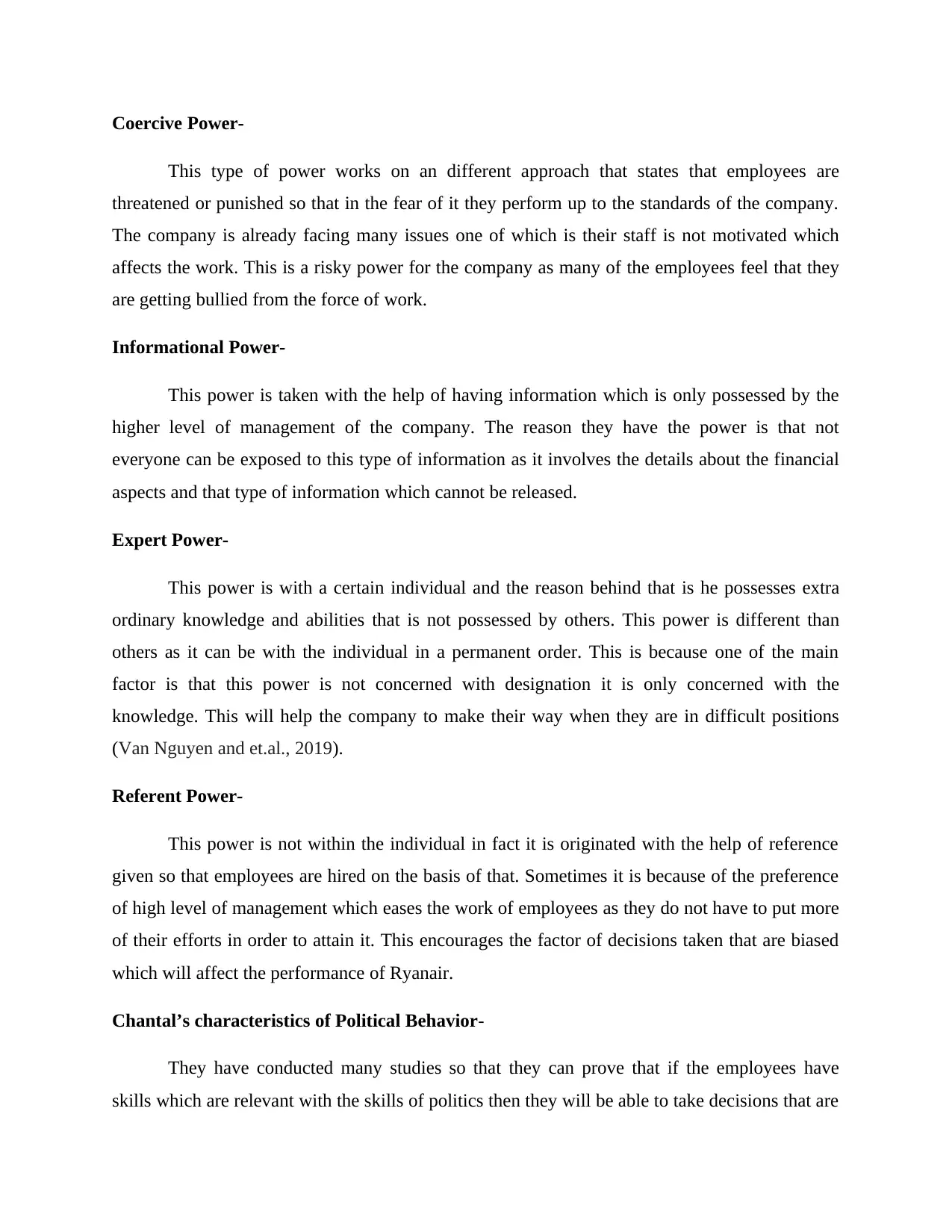
Coercive Power-
This type of power works on an different approach that states that employees are
threatened or punished so that in the fear of it they perform up to the standards of the company.
The company is already facing many issues one of which is their staff is not motivated which
affects the work. This is a risky power for the company as many of the employees feel that they
are getting bullied from the force of work.
Informational Power-
This power is taken with the help of having information which is only possessed by the
higher level of management of the company. The reason they have the power is that not
everyone can be exposed to this type of information as it involves the details about the financial
aspects and that type of information which cannot be released.
Expert Power-
This power is with a certain individual and the reason behind that is he possesses extra
ordinary knowledge and abilities that is not possessed by others. This power is different than
others as it can be with the individual in a permanent order. This is because one of the main
factor is that this power is not concerned with designation it is only concerned with the
knowledge. This will help the company to make their way when they are in difficult positions
(Van Nguyen and et.al., 2019).
Referent Power-
This power is not within the individual in fact it is originated with the help of reference
given so that employees are hired on the basis of that. Sometimes it is because of the preference
of high level of management which eases the work of employees as they do not have to put more
of their efforts in order to attain it. This encourages the factor of decisions taken that are biased
which will affect the performance of Ryanair.
Chantal’s characteristics of Political Behavior-
They have conducted many studies so that they can prove that if the employees have
skills which are relevant with the skills of politics then they will be able to take decisions that are
This type of power works on an different approach that states that employees are
threatened or punished so that in the fear of it they perform up to the standards of the company.
The company is already facing many issues one of which is their staff is not motivated which
affects the work. This is a risky power for the company as many of the employees feel that they
are getting bullied from the force of work.
Informational Power-
This power is taken with the help of having information which is only possessed by the
higher level of management of the company. The reason they have the power is that not
everyone can be exposed to this type of information as it involves the details about the financial
aspects and that type of information which cannot be released.
Expert Power-
This power is with a certain individual and the reason behind that is he possesses extra
ordinary knowledge and abilities that is not possessed by others. This power is different than
others as it can be with the individual in a permanent order. This is because one of the main
factor is that this power is not concerned with designation it is only concerned with the
knowledge. This will help the company to make their way when they are in difficult positions
(Van Nguyen and et.al., 2019).
Referent Power-
This power is not within the individual in fact it is originated with the help of reference
given so that employees are hired on the basis of that. Sometimes it is because of the preference
of high level of management which eases the work of employees as they do not have to put more
of their efforts in order to attain it. This encourages the factor of decisions taken that are biased
which will affect the performance of Ryanair.
Chantal’s characteristics of Political Behavior-
They have conducted many studies so that they can prove that if the employees have
skills which are relevant with the skills of politics then they will be able to take decisions that are
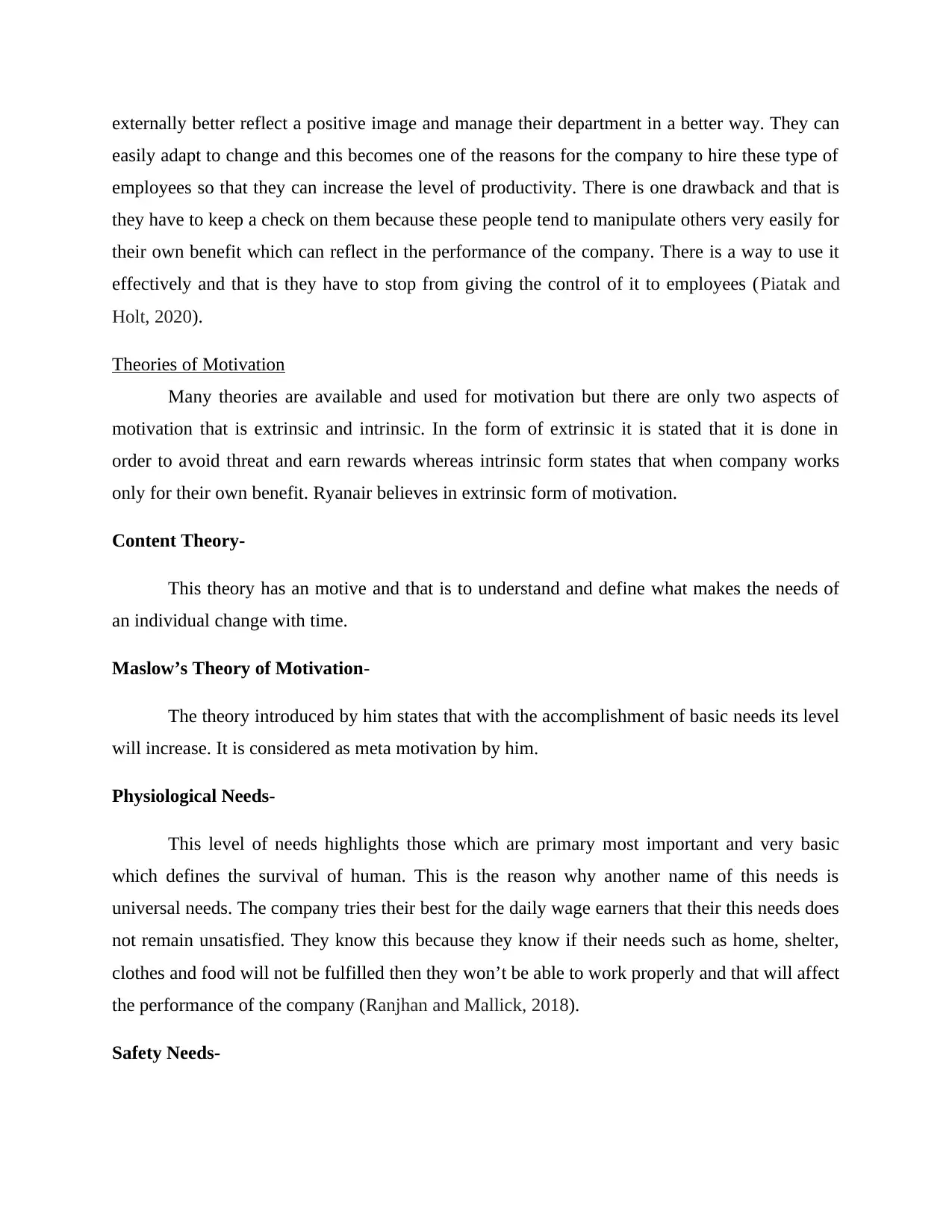
externally better reflect a positive image and manage their department in a better way. They can
easily adapt to change and this becomes one of the reasons for the company to hire these type of
employees so that they can increase the level of productivity. There is one drawback and that is
they have to keep a check on them because these people tend to manipulate others very easily for
their own benefit which can reflect in the performance of the company. There is a way to use it
effectively and that is they have to stop from giving the control of it to employees (Piatak and
Holt, 2020).
Theories of Motivation
Many theories are available and used for motivation but there are only two aspects of
motivation that is extrinsic and intrinsic. In the form of extrinsic it is stated that it is done in
order to avoid threat and earn rewards whereas intrinsic form states that when company works
only for their own benefit. Ryanair believes in extrinsic form of motivation.
Content Theory-
This theory has an motive and that is to understand and define what makes the needs of
an individual change with time.
Maslow’s Theory of Motivation-
The theory introduced by him states that with the accomplishment of basic needs its level
will increase. It is considered as meta motivation by him.
Physiological Needs-
This level of needs highlights those which are primary most important and very basic
which defines the survival of human. This is the reason why another name of this needs is
universal needs. The company tries their best for the daily wage earners that their this needs does
not remain unsatisfied. They know this because they know if their needs such as home, shelter,
clothes and food will not be fulfilled then they won’t be able to work properly and that will affect
the performance of the company (Ranjhan and Mallick, 2018).
Safety Needs-
easily adapt to change and this becomes one of the reasons for the company to hire these type of
employees so that they can increase the level of productivity. There is one drawback and that is
they have to keep a check on them because these people tend to manipulate others very easily for
their own benefit which can reflect in the performance of the company. There is a way to use it
effectively and that is they have to stop from giving the control of it to employees (Piatak and
Holt, 2020).
Theories of Motivation
Many theories are available and used for motivation but there are only two aspects of
motivation that is extrinsic and intrinsic. In the form of extrinsic it is stated that it is done in
order to avoid threat and earn rewards whereas intrinsic form states that when company works
only for their own benefit. Ryanair believes in extrinsic form of motivation.
Content Theory-
This theory has an motive and that is to understand and define what makes the needs of
an individual change with time.
Maslow’s Theory of Motivation-
The theory introduced by him states that with the accomplishment of basic needs its level
will increase. It is considered as meta motivation by him.
Physiological Needs-
This level of needs highlights those which are primary most important and very basic
which defines the survival of human. This is the reason why another name of this needs is
universal needs. The company tries their best for the daily wage earners that their this needs does
not remain unsatisfied. They know this because they know if their needs such as home, shelter,
clothes and food will not be fulfilled then they won’t be able to work properly and that will affect
the performance of the company (Ranjhan and Mallick, 2018).
Safety Needs-
⊘ This is a preview!⊘
Do you want full access?
Subscribe today to unlock all pages.

Trusted by 1+ million students worldwide
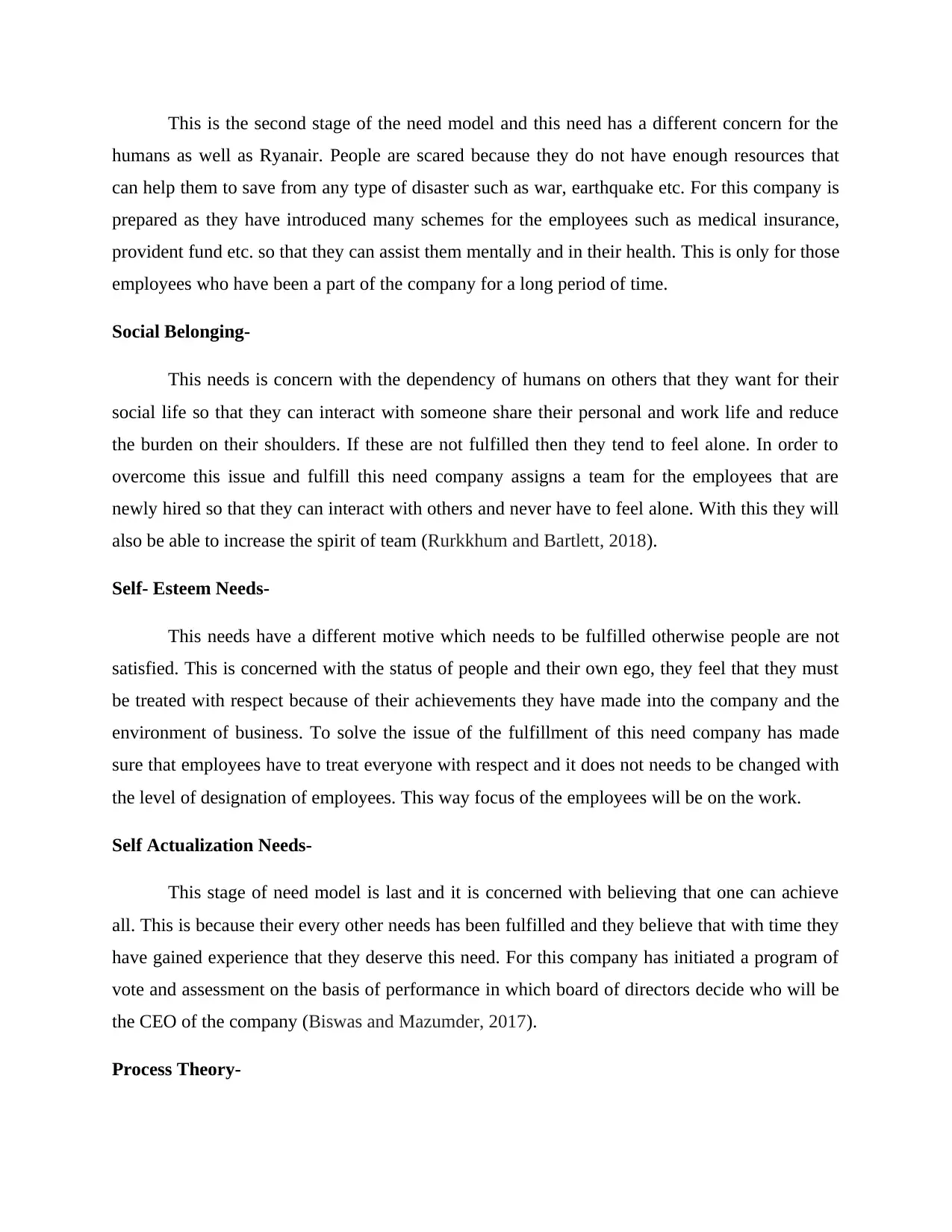
This is the second stage of the need model and this need has a different concern for the
humans as well as Ryanair. People are scared because they do not have enough resources that
can help them to save from any type of disaster such as war, earthquake etc. For this company is
prepared as they have introduced many schemes for the employees such as medical insurance,
provident fund etc. so that they can assist them mentally and in their health. This is only for those
employees who have been a part of the company for a long period of time.
Social Belonging-
This needs is concern with the dependency of humans on others that they want for their
social life so that they can interact with someone share their personal and work life and reduce
the burden on their shoulders. If these are not fulfilled then they tend to feel alone. In order to
overcome this issue and fulfill this need company assigns a team for the employees that are
newly hired so that they can interact with others and never have to feel alone. With this they will
also be able to increase the spirit of team (Rurkkhum and Bartlett, 2018).
Self- Esteem Needs-
This needs have a different motive which needs to be fulfilled otherwise people are not
satisfied. This is concerned with the status of people and their own ego, they feel that they must
be treated with respect because of their achievements they have made into the company and the
environment of business. To solve the issue of the fulfillment of this need company has made
sure that employees have to treat everyone with respect and it does not needs to be changed with
the level of designation of employees. This way focus of the employees will be on the work.
Self Actualization Needs-
This stage of need model is last and it is concerned with believing that one can achieve
all. This is because their every other needs has been fulfilled and they believe that with time they
have gained experience that they deserve this need. For this company has initiated a program of
vote and assessment on the basis of performance in which board of directors decide who will be
the CEO of the company (Biswas and Mazumder, 2017).
Process Theory-
humans as well as Ryanair. People are scared because they do not have enough resources that
can help them to save from any type of disaster such as war, earthquake etc. For this company is
prepared as they have introduced many schemes for the employees such as medical insurance,
provident fund etc. so that they can assist them mentally and in their health. This is only for those
employees who have been a part of the company for a long period of time.
Social Belonging-
This needs is concern with the dependency of humans on others that they want for their
social life so that they can interact with someone share their personal and work life and reduce
the burden on their shoulders. If these are not fulfilled then they tend to feel alone. In order to
overcome this issue and fulfill this need company assigns a team for the employees that are
newly hired so that they can interact with others and never have to feel alone. With this they will
also be able to increase the spirit of team (Rurkkhum and Bartlett, 2018).
Self- Esteem Needs-
This needs have a different motive which needs to be fulfilled otherwise people are not
satisfied. This is concerned with the status of people and their own ego, they feel that they must
be treated with respect because of their achievements they have made into the company and the
environment of business. To solve the issue of the fulfillment of this need company has made
sure that employees have to treat everyone with respect and it does not needs to be changed with
the level of designation of employees. This way focus of the employees will be on the work.
Self Actualization Needs-
This stage of need model is last and it is concerned with believing that one can achieve
all. This is because their every other needs has been fulfilled and they believe that with time they
have gained experience that they deserve this need. For this company has initiated a program of
vote and assessment on the basis of performance in which board of directors decide who will be
the CEO of the company (Biswas and Mazumder, 2017).
Process Theory-
Paraphrase This Document
Need a fresh take? Get an instant paraphrase of this document with our AI Paraphraser
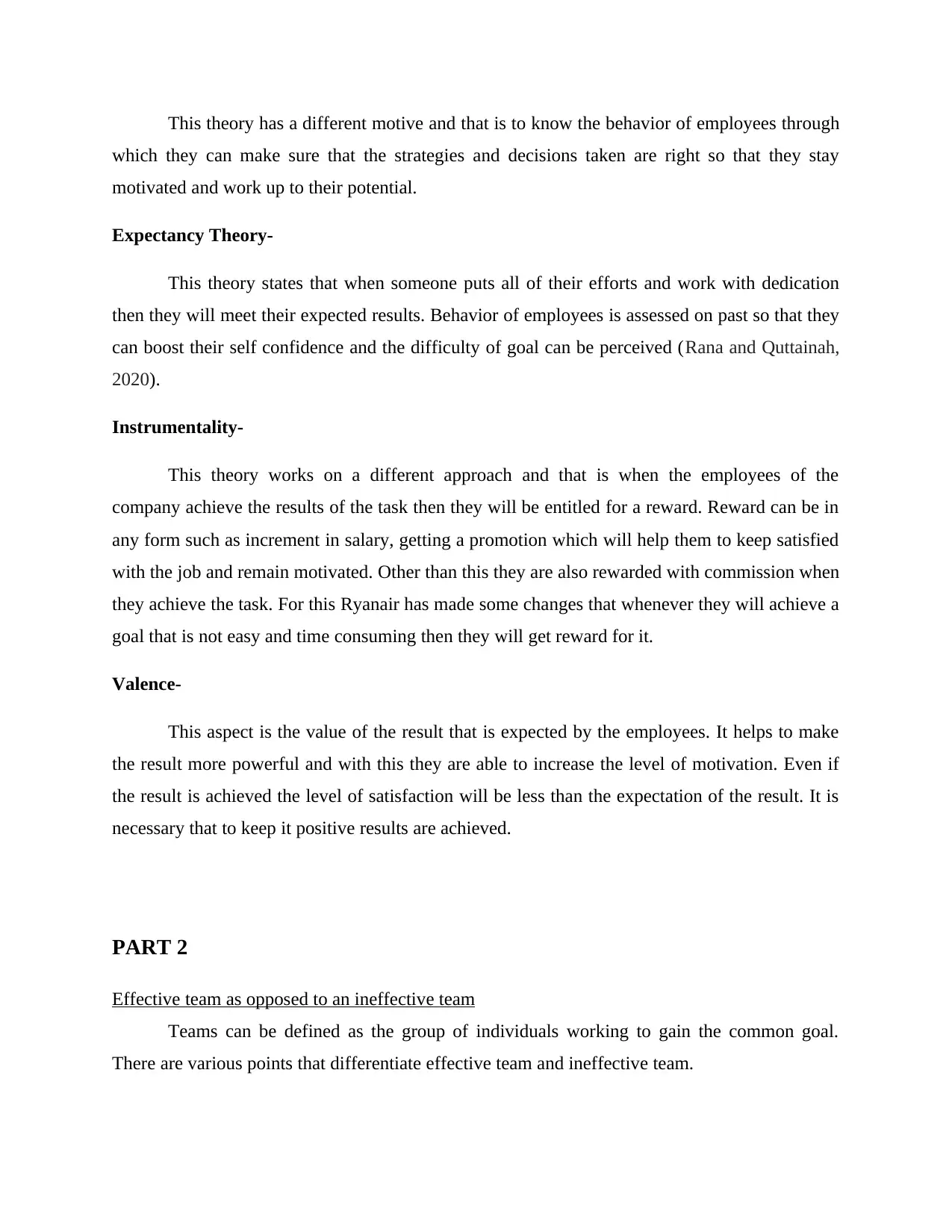
This theory has a different motive and that is to know the behavior of employees through
which they can make sure that the strategies and decisions taken are right so that they stay
motivated and work up to their potential.
Expectancy Theory-
This theory states that when someone puts all of their efforts and work with dedication
then they will meet their expected results. Behavior of employees is assessed on past so that they
can boost their self confidence and the difficulty of goal can be perceived (Rana and Quttainah,
2020).
Instrumentality-
This theory works on a different approach and that is when the employees of the
company achieve the results of the task then they will be entitled for a reward. Reward can be in
any form such as increment in salary, getting a promotion which will help them to keep satisfied
with the job and remain motivated. Other than this they are also rewarded with commission when
they achieve the task. For this Ryanair has made some changes that whenever they will achieve a
goal that is not easy and time consuming then they will get reward for it.
Valence-
This aspect is the value of the result that is expected by the employees. It helps to make
the result more powerful and with this they are able to increase the level of motivation. Even if
the result is achieved the level of satisfaction will be less than the expectation of the result. It is
necessary that to keep it positive results are achieved.
PART 2
Effective team as opposed to an ineffective team
Teams can be defined as the group of individuals working to gain the common goal.
There are various points that differentiate effective team and ineffective team.
which they can make sure that the strategies and decisions taken are right so that they stay
motivated and work up to their potential.
Expectancy Theory-
This theory states that when someone puts all of their efforts and work with dedication
then they will meet their expected results. Behavior of employees is assessed on past so that they
can boost their self confidence and the difficulty of goal can be perceived (Rana and Quttainah,
2020).
Instrumentality-
This theory works on a different approach and that is when the employees of the
company achieve the results of the task then they will be entitled for a reward. Reward can be in
any form such as increment in salary, getting a promotion which will help them to keep satisfied
with the job and remain motivated. Other than this they are also rewarded with commission when
they achieve the task. For this Ryanair has made some changes that whenever they will achieve a
goal that is not easy and time consuming then they will get reward for it.
Valence-
This aspect is the value of the result that is expected by the employees. It helps to make
the result more powerful and with this they are able to increase the level of motivation. Even if
the result is achieved the level of satisfaction will be less than the expectation of the result. It is
necessary that to keep it positive results are achieved.
PART 2
Effective team as opposed to an ineffective team
Teams can be defined as the group of individuals working to gain the common goal.
There are various points that differentiate effective team and ineffective team.
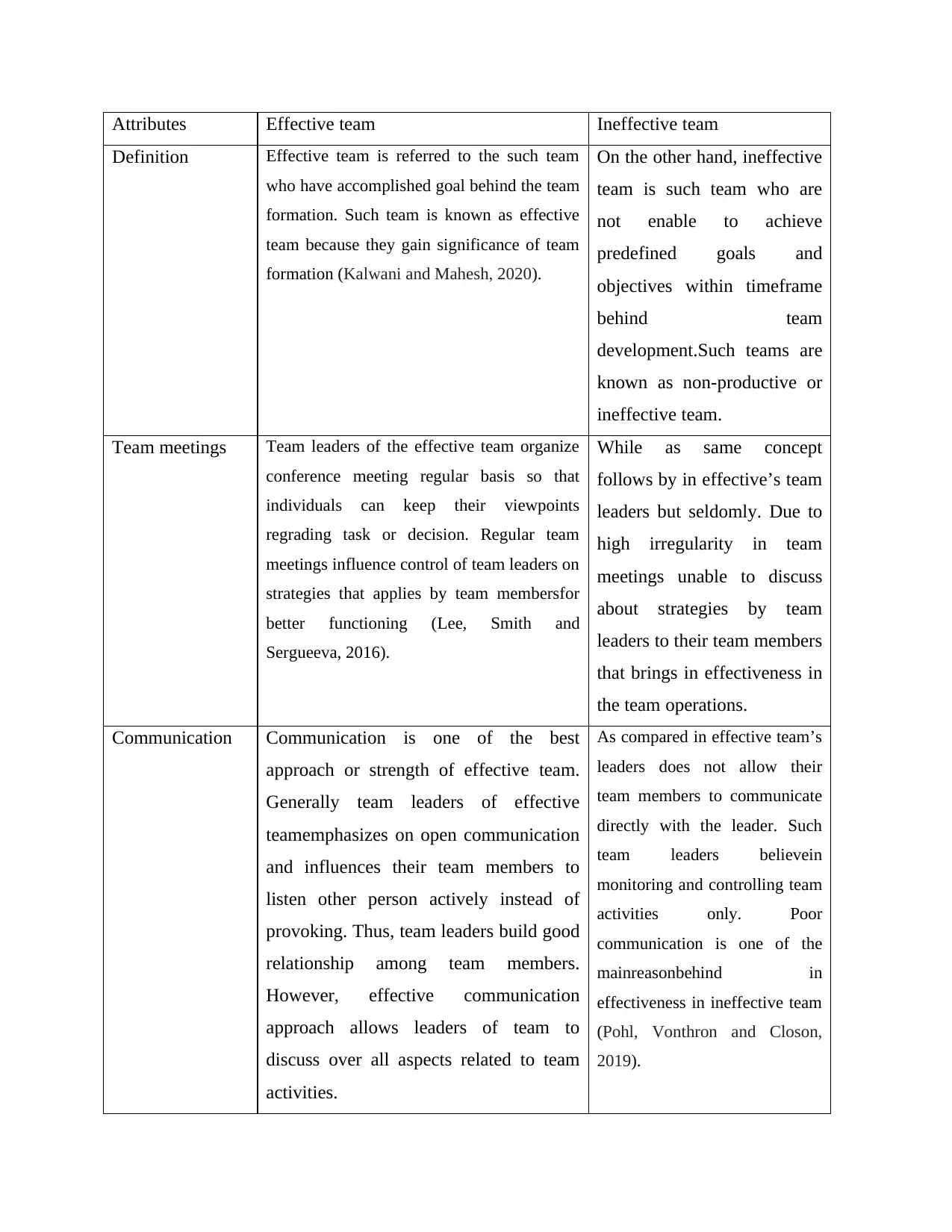
Attributes Effective team Ineffective team
Definition Effective team is referred to the such team
who have accomplished goal behind the team
formation. Such team is known as effective
team because they gain significance of team
formation (Kalwani and Mahesh, 2020).
On the other hand, ineffective
team is such team who are
not enable to achieve
predefined goals and
objectives within timeframe
behind team
development.Such teams are
known as non-productive or
ineffective team.
Team meetings Team leaders of the effective team organize
conference meeting regular basis so that
individuals can keep their viewpoints
regrading task or decision. Regular team
meetings influence control of team leaders on
strategies that applies by team membersfor
better functioning (Lee, Smith and
Sergueeva, 2016).
While as same concept
follows by in effective’s team
leaders but seldomly. Due to
high irregularity in team
meetings unable to discuss
about strategies by team
leaders to their team members
that brings in effectiveness in
the team operations.
Communication Communication is one of the best
approach or strength of effective team.
Generally team leaders of effective
teamemphasizes on open communication
and influences their team members to
listen other person actively instead of
provoking. Thus, team leaders build good
relationship among team members.
However, effective communication
approach allows leaders of team to
discuss over all aspects related to team
activities.
As compared in effective team’s
leaders does not allow their
team members to communicate
directly with the leader. Such
team leaders believein
monitoring and controlling team
activities only. Poor
communication is one of the
mainreasonbehind in
effectiveness in ineffective team
(Pohl, Vonthron and Closon,
2019).
Definition Effective team is referred to the such team
who have accomplished goal behind the team
formation. Such team is known as effective
team because they gain significance of team
formation (Kalwani and Mahesh, 2020).
On the other hand, ineffective
team is such team who are
not enable to achieve
predefined goals and
objectives within timeframe
behind team
development.Such teams are
known as non-productive or
ineffective team.
Team meetings Team leaders of the effective team organize
conference meeting regular basis so that
individuals can keep their viewpoints
regrading task or decision. Regular team
meetings influence control of team leaders on
strategies that applies by team membersfor
better functioning (Lee, Smith and
Sergueeva, 2016).
While as same concept
follows by in effective’s team
leaders but seldomly. Due to
high irregularity in team
meetings unable to discuss
about strategies by team
leaders to their team members
that brings in effectiveness in
the team operations.
Communication Communication is one of the best
approach or strength of effective team.
Generally team leaders of effective
teamemphasizes on open communication
and influences their team members to
listen other person actively instead of
provoking. Thus, team leaders build good
relationship among team members.
However, effective communication
approach allows leaders of team to
discuss over all aspects related to team
activities.
As compared in effective team’s
leaders does not allow their
team members to communicate
directly with the leader. Such
team leaders believein
monitoring and controlling team
activities only. Poor
communication is one of the
mainreasonbehind in
effectiveness in ineffective team
(Pohl, Vonthron and Closon,
2019).
⊘ This is a preview!⊘
Do you want full access?
Subscribe today to unlock all pages.

Trusted by 1+ million students worldwide
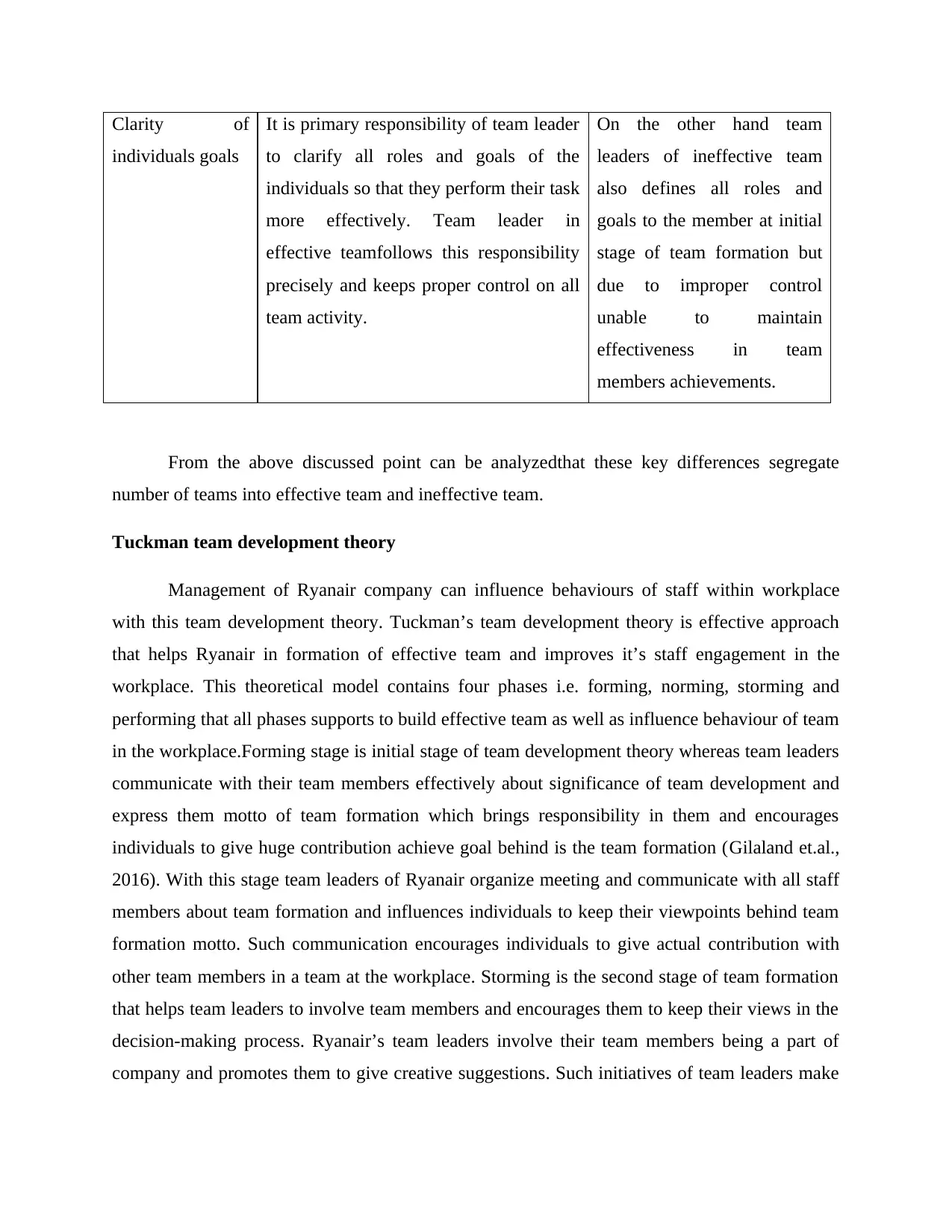
Clarity of
individuals goals
It is primary responsibility of team leader
to clarify all roles and goals of the
individuals so that they perform their task
more effectively. Team leader in
effective teamfollows this responsibility
precisely and keeps proper control on all
team activity.
On the other hand team
leaders of ineffective team
also defines all roles and
goals to the member at initial
stage of team formation but
due to improper control
unable to maintain
effectiveness in team
members achievements.
From the above discussed point can be analyzedthat these key differences segregate
number of teams into effective team and ineffective team.
Tuckman team development theory
Management of Ryanair company can influence behaviours of staff within workplace
with this team development theory. Tuckman’s team development theory is effective approach
that helps Ryanair in formation of effective team and improves it’s staff engagement in the
workplace. This theoretical model contains four phases i.e. forming, norming, storming and
performing that all phases supports to build effective team as well as influence behaviour of team
in the workplace.Forming stage is initial stage of team development theory whereas team leaders
communicate with their team members effectively about significance of team development and
express them motto of team formation which brings responsibility in them and encourages
individuals to give huge contribution achieve goal behind is the team formation (Gilaland et.al.,
2016). With this stage team leaders of Ryanair organize meeting and communicate with all staff
members about team formation and influences individuals to keep their viewpoints behind team
formation motto. Such communication encourages individuals to give actual contribution with
other team members in a team at the workplace. Storming is the second stage of team formation
that helps team leaders to involve team members and encourages them to keep their views in the
decision-making process. Ryanair’s team leaders involve their team members being a part of
company and promotes them to give creative suggestions. Such initiatives of team leaders make
individuals goals
It is primary responsibility of team leader
to clarify all roles and goals of the
individuals so that they perform their task
more effectively. Team leader in
effective teamfollows this responsibility
precisely and keeps proper control on all
team activity.
On the other hand team
leaders of ineffective team
also defines all roles and
goals to the member at initial
stage of team formation but
due to improper control
unable to maintain
effectiveness in team
members achievements.
From the above discussed point can be analyzedthat these key differences segregate
number of teams into effective team and ineffective team.
Tuckman team development theory
Management of Ryanair company can influence behaviours of staff within workplace
with this team development theory. Tuckman’s team development theory is effective approach
that helps Ryanair in formation of effective team and improves it’s staff engagement in the
workplace. This theoretical model contains four phases i.e. forming, norming, storming and
performing that all phases supports to build effective team as well as influence behaviour of team
in the workplace.Forming stage is initial stage of team development theory whereas team leaders
communicate with their team members effectively about significance of team development and
express them motto of team formation which brings responsibility in them and encourages
individuals to give huge contribution achieve goal behind is the team formation (Gilaland et.al.,
2016). With this stage team leaders of Ryanair organize meeting and communicate with all staff
members about team formation and influences individuals to keep their viewpoints behind team
formation motto. Such communication encourages individuals to give actual contribution with
other team members in a team at the workplace. Storming is the second stage of team formation
that helps team leaders to involve team members and encourages them to keep their views in the
decision-making process. Ryanair’s team leaders involve their team members being a part of
company and promotes them to give creative suggestions. Such initiatives of team leaders make
Paraphrase This Document
Need a fresh take? Get an instant paraphrase of this document with our AI Paraphraser
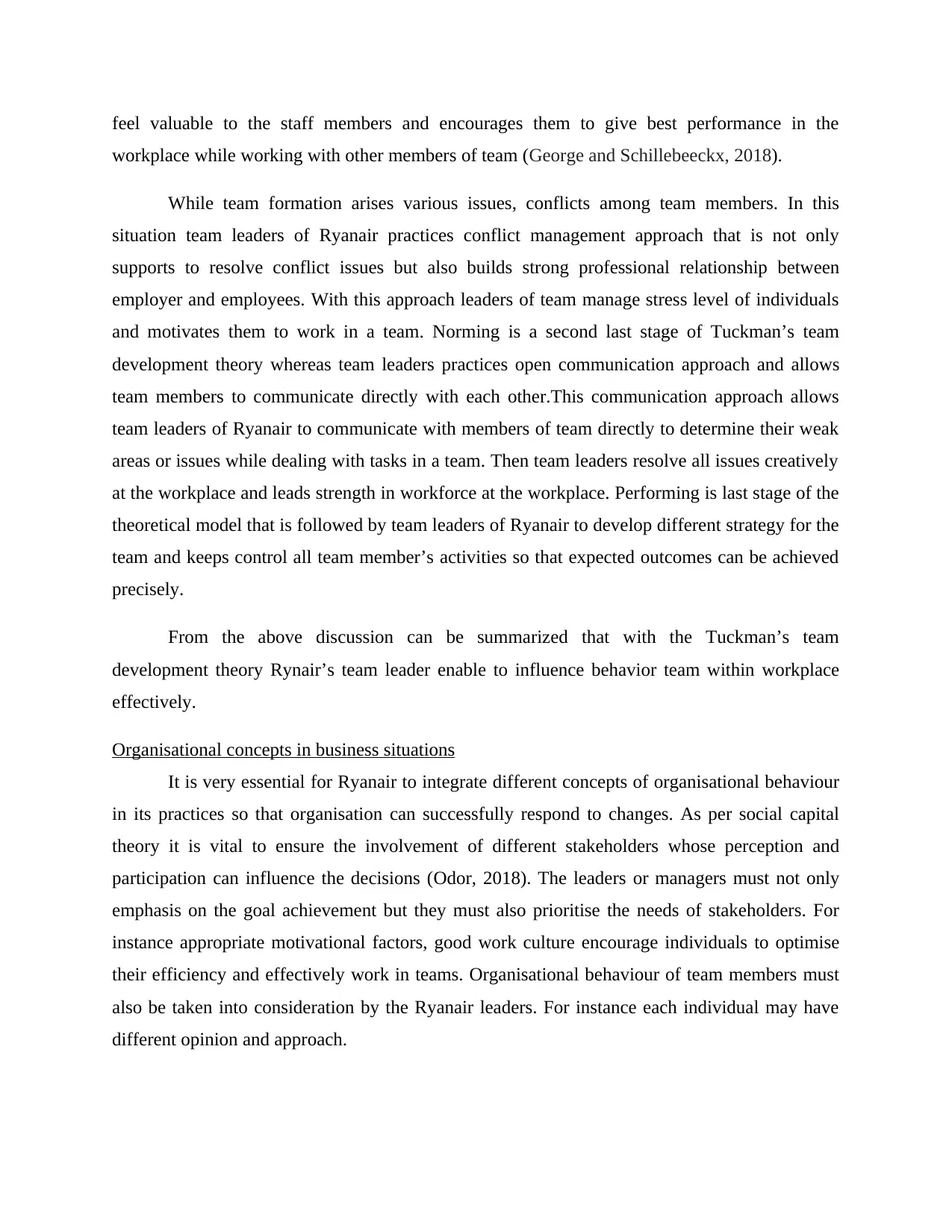
feel valuable to the staff members and encourages them to give best performance in the
workplace while working with other members of team (George and Schillebeeckx, 2018).
While team formation arises various issues, conflicts among team members. In this
situation team leaders of Ryanair practices conflict management approach that is not only
supports to resolve conflict issues but also builds strong professional relationship between
employer and employees. With this approach leaders of team manage stress level of individuals
and motivates them to work in a team. Norming is a second last stage of Tuckman’s team
development theory whereas team leaders practices open communication approach and allows
team members to communicate directly with each other.This communication approach allows
team leaders of Ryanair to communicate with members of team directly to determine their weak
areas or issues while dealing with tasks in a team. Then team leaders resolve all issues creatively
at the workplace and leads strength in workforce at the workplace. Performing is last stage of the
theoretical model that is followed by team leaders of Ryanair to develop different strategy for the
team and keeps control all team member’s activities so that expected outcomes can be achieved
precisely.
From the above discussion can be summarized that with the Tuckman’s team
development theory Rynair’s team leader enable to influence behavior team within workplace
effectively.
Organisational concepts in business situations
It is very essential for Ryanair to integrate different concepts of organisational behaviour
in its practices so that organisation can successfully respond to changes. As per social capital
theory it is vital to ensure the involvement of different stakeholders whose perception and
participation can influence the decisions (Odor, 2018). The leaders or managers must not only
emphasis on the goal achievement but they must also prioritise the needs of stakeholders. For
instance appropriate motivational factors, good work culture encourage individuals to optimise
their efficiency and effectively work in teams. Organisational behaviour of team members must
also be taken into consideration by the Ryanair leaders. For instance each individual may have
different opinion and approach.
workplace while working with other members of team (George and Schillebeeckx, 2018).
While team formation arises various issues, conflicts among team members. In this
situation team leaders of Ryanair practices conflict management approach that is not only
supports to resolve conflict issues but also builds strong professional relationship between
employer and employees. With this approach leaders of team manage stress level of individuals
and motivates them to work in a team. Norming is a second last stage of Tuckman’s team
development theory whereas team leaders practices open communication approach and allows
team members to communicate directly with each other.This communication approach allows
team leaders of Ryanair to communicate with members of team directly to determine their weak
areas or issues while dealing with tasks in a team. Then team leaders resolve all issues creatively
at the workplace and leads strength in workforce at the workplace. Performing is last stage of the
theoretical model that is followed by team leaders of Ryanair to develop different strategy for the
team and keeps control all team member’s activities so that expected outcomes can be achieved
precisely.
From the above discussion can be summarized that with the Tuckman’s team
development theory Rynair’s team leader enable to influence behavior team within workplace
effectively.
Organisational concepts in business situations
It is very essential for Ryanair to integrate different concepts of organisational behaviour
in its practices so that organisation can successfully respond to changes. As per social capital
theory it is vital to ensure the involvement of different stakeholders whose perception and
participation can influence the decisions (Odor, 2018). The leaders or managers must not only
emphasis on the goal achievement but they must also prioritise the needs of stakeholders. For
instance appropriate motivational factors, good work culture encourage individuals to optimise
their efficiency and effectively work in teams. Organisational behaviour of team members must
also be taken into consideration by the Ryanair leaders. For instance each individual may have
different opinion and approach.
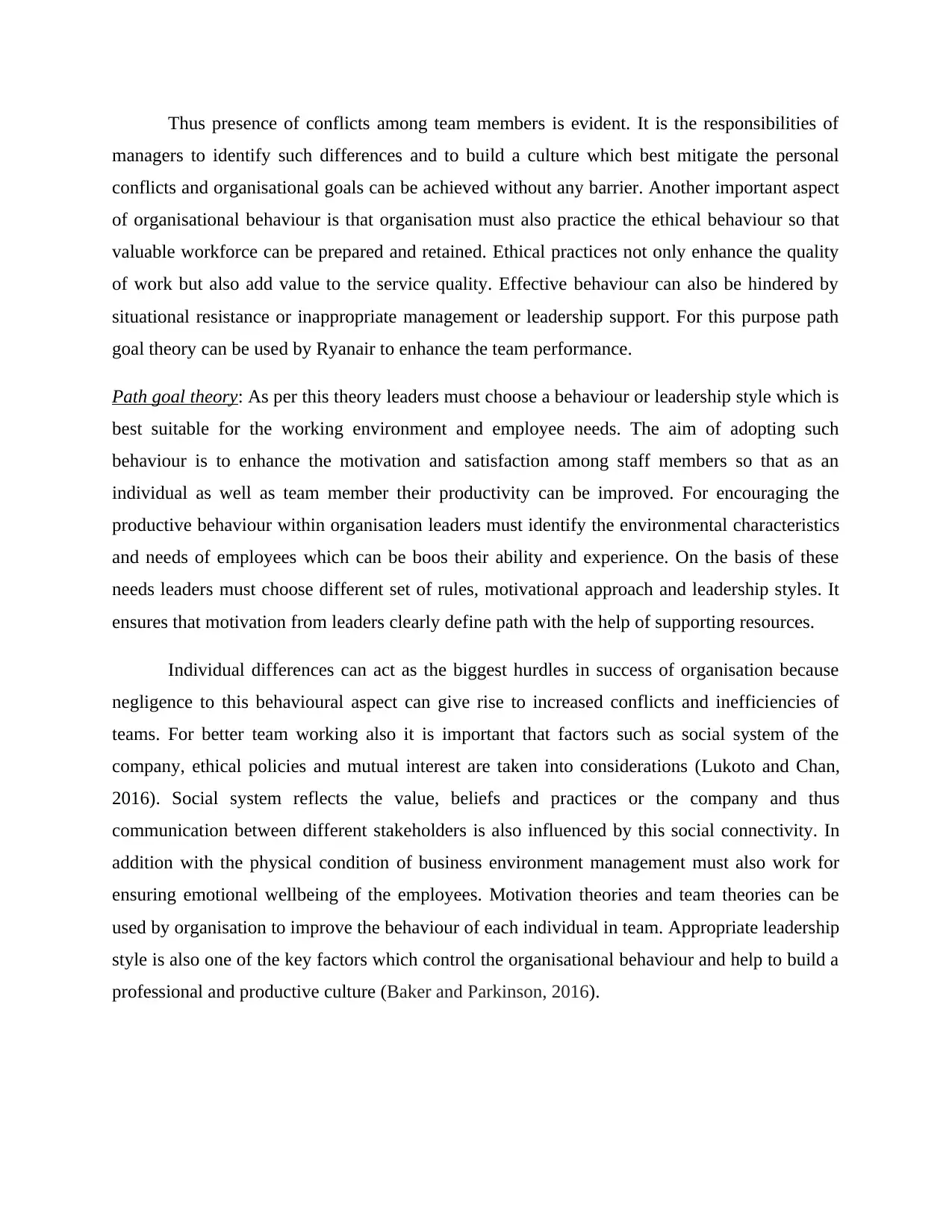
Thus presence of conflicts among team members is evident. It is the responsibilities of
managers to identify such differences and to build a culture which best mitigate the personal
conflicts and organisational goals can be achieved without any barrier. Another important aspect
of organisational behaviour is that organisation must also practice the ethical behaviour so that
valuable workforce can be prepared and retained. Ethical practices not only enhance the quality
of work but also add value to the service quality. Effective behaviour can also be hindered by
situational resistance or inappropriate management or leadership support. For this purpose path
goal theory can be used by Ryanair to enhance the team performance.
Path goal theory: As per this theory leaders must choose a behaviour or leadership style which is
best suitable for the working environment and employee needs. The aim of adopting such
behaviour is to enhance the motivation and satisfaction among staff members so that as an
individual as well as team member their productivity can be improved. For encouraging the
productive behaviour within organisation leaders must identify the environmental characteristics
and needs of employees which can be boos their ability and experience. On the basis of these
needs leaders must choose different set of rules, motivational approach and leadership styles. It
ensures that motivation from leaders clearly define path with the help of supporting resources.
Individual differences can act as the biggest hurdles in success of organisation because
negligence to this behavioural aspect can give rise to increased conflicts and inefficiencies of
teams. For better team working also it is important that factors such as social system of the
company, ethical policies and mutual interest are taken into considerations (Lukoto and Chan,
2016). Social system reflects the value, beliefs and practices or the company and thus
communication between different stakeholders is also influenced by this social connectivity. In
addition with the physical condition of business environment management must also work for
ensuring emotional wellbeing of the employees. Motivation theories and team theories can be
used by organisation to improve the behaviour of each individual in team. Appropriate leadership
style is also one of the key factors which control the organisational behaviour and help to build a
professional and productive culture (Baker and Parkinson, 2016).
managers to identify such differences and to build a culture which best mitigate the personal
conflicts and organisational goals can be achieved without any barrier. Another important aspect
of organisational behaviour is that organisation must also practice the ethical behaviour so that
valuable workforce can be prepared and retained. Ethical practices not only enhance the quality
of work but also add value to the service quality. Effective behaviour can also be hindered by
situational resistance or inappropriate management or leadership support. For this purpose path
goal theory can be used by Ryanair to enhance the team performance.
Path goal theory: As per this theory leaders must choose a behaviour or leadership style which is
best suitable for the working environment and employee needs. The aim of adopting such
behaviour is to enhance the motivation and satisfaction among staff members so that as an
individual as well as team member their productivity can be improved. For encouraging the
productive behaviour within organisation leaders must identify the environmental characteristics
and needs of employees which can be boos their ability and experience. On the basis of these
needs leaders must choose different set of rules, motivational approach and leadership styles. It
ensures that motivation from leaders clearly define path with the help of supporting resources.
Individual differences can act as the biggest hurdles in success of organisation because
negligence to this behavioural aspect can give rise to increased conflicts and inefficiencies of
teams. For better team working also it is important that factors such as social system of the
company, ethical policies and mutual interest are taken into considerations (Lukoto and Chan,
2016). Social system reflects the value, beliefs and practices or the company and thus
communication between different stakeholders is also influenced by this social connectivity. In
addition with the physical condition of business environment management must also work for
ensuring emotional wellbeing of the employees. Motivation theories and team theories can be
used by organisation to improve the behaviour of each individual in team. Appropriate leadership
style is also one of the key factors which control the organisational behaviour and help to build a
professional and productive culture (Baker and Parkinson, 2016).
⊘ This is a preview!⊘
Do you want full access?
Subscribe today to unlock all pages.

Trusted by 1+ million students worldwide
1 out of 15
Related Documents
Your All-in-One AI-Powered Toolkit for Academic Success.
+13062052269
info@desklib.com
Available 24*7 on WhatsApp / Email
![[object Object]](/_next/static/media/star-bottom.7253800d.svg)
Unlock your academic potential
Copyright © 2020–2026 A2Z Services. All Rights Reserved. Developed and managed by ZUCOL.





